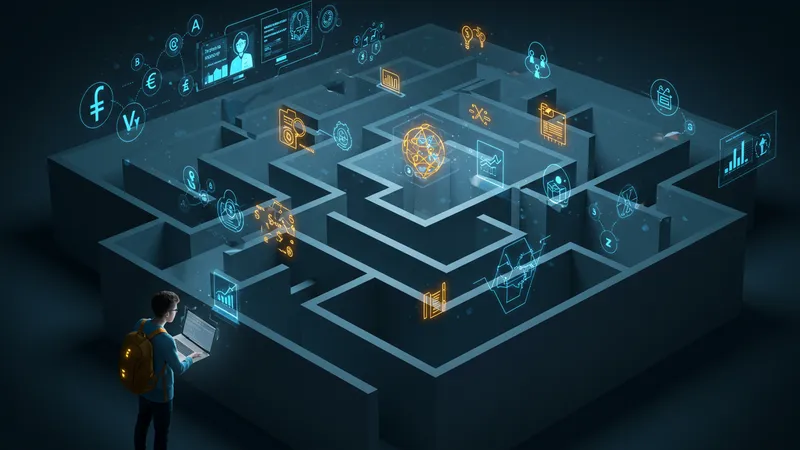Did you know that a shocking 67% of university students in Pakistan now earn their primary income online? Whether it's tuition fees or helping out family finances, this isn’t just a side hustle anymore.
In 2025, with more students turning to the web for earnings, online jobs are more critical than ever. From rozi roti to future-proofing careers, here's why you should care.

But what exactly are these jobs doing to traditional career paths in Pakistan? While some celebrate the freedom, others warn of severe financial instability. For instance, some students report making more in a month than the starting salary of a typical entry-level job, while others face unpredictable earnings.
Meanwhile, online work platforms claim to offer unprecedented opportunities, but does that mean these platforms are always fair? There are stories of miraculous career kicks but also tales of nightmarish client exchanges and scams. But that’s not even the wildest part…
Recent insights show that students are not just earning but creating their businesses, right from their university dorms. This trend is redefining entrepreneurship in a traditionally risk-averse society like Pakistan. Will it change the perception of risk in careers forever? What happens next shocked even the experts…
In the online workforce, demand isn’t the only thing that’s changing — the skills necessary to thrive are evolving too. Students today are harnessing skills like SEO optimization, digital marketing, and app development. With just a certification, some have managed to double their rates virtually overnight. It’s a modern-day gold rush for those savvy enough to see it. These skills aren’t just desirable; they’re downright essential for success.

But there's a catch! The competition is fierce, pushing more students into learning advanced and niche skills. Did you know online communication skills are now considered more valuable than a degree in some cases? Yes, even the experts say the soft skills are harder to learn. Yet, they hold the key.
However, tapping into these opportunities isn’t without its pitfalls either. Among the many students, only a fraction knows how to leverage LinkedIn to grab international clients, although this strategy alone could dramatically elevate a student’s profile. How are they missing this trick?
The landscape of online work is still volatile. A single update in platforms like Upwork can swing fortunes. But here’s another twist — the future seems more promising than ever. What you read next might change how you see this forever.
One persistent myth is that online jobs are easy quick-fix solutions for students. In reality, balancing academics with such demanding work schedules is a herculean task. The pressure of assignments combined with client deadlines can be intense. But students have been creatively tackling this issue by honing incredible time-management skills.

Then there’s the question of social life — is it all work and no play? Students often confess that their social calendars do take a backseat. But many find joy in online communities. They are forming meaningful connections and even professional networks across the globe. It’s not just about the money anymore.
Moreover, the freedom to work from anywhere is an alluring benefit. The idea of sipping chai in a cozy café while managing an online gig gives students a taste of digital nomadism right from their own cities. This freedom can be liberating or disastrous depending on self-discipline.
But what does this mean for the future of traditional jobs? Will degrees lose their sheen? Or will new hybrid forms of education and employment emerge? This blend is just the beginning of a larger revolution. There’s one more twist in this evolving story...
There's a burgeoning skepticism about whether this online job boom is truly sustainable. Are students setting themselves up for long-term career paths or riding on a temporary bubble? Economists warn of inflated expectations that fail to consider market saturation, making it a risky venture.

Contrarily, proponents argue that as technology advances, traditional roles will gradually diminish, making these digital roles foundational. The capacity for high earnings and forming startups is not only aspirational but feasible. Economic trends are shifting faster than ever, spurred on by increased internet penetration.
The societal change this brings about is unprecedented. Communities are more connected, and economic barriers are broken down as students collaborate across borders. But is cultural identity being preserved in this digital age? It’s a question many are now pondering.
And then, there’s the role of government and policy in shaping this new economy. Is there enough being done to harness this shift or are potential pitfalls being overlooked? Keep reading to see the facts that can't be ignored...
Forget conventional employment; today’s students are creating opportunities from scratch. There's a growing trend of students launching their businesses, often inspired by their online gigs. They are entering markets that didn’t exist a few years ago, redefining what it means to ‘go to work’ in Pakistan.

While many pursue entrepreneurship out of passion, others are driven by necessity. Between rising tuition costs and lack of traditional jobs, starting a business becomes a viable option. It’s a revolution led by innovation, but riddled with financial risks.
These ventures range from creating educational content, selling artistic creations, to localized e-commerce that speaks to Pakistan’s unique societal needs. It’s an exciting yet perilous journey where every success story has countless untold failures. What's the sacrifice behind the triumphs?
For every student building a business empire, there are just as many struggling to break even. Is Pakistan ready for this entrepreneurial wave, or are we heading towards oversaturation? Stay tuned as deeper truths are revealed...
While the growth of online jobs is undeniable, governmental policies remain a critical factor in sustaining this shift. Has the local policy environment kept pace with the online job market's rapid evolution? Many argue there's still much to be desired.

Taxation is one area where clarity is sorely needed. The ambiguity surrounding earnings from online jobs often puts students in precarious legal standings. It’s a regulatory labyrinth that can hurt more than it helps if not navigated carefully.
Moreover, regulations regarding cyber security and intellectual property rights need more robust frameworks to protect young entrepreneurs. With digital fraud remaining a constant threat, is anyone truly safe online?
The next big policy question revolves around data privacy. As students juggle multiple platforms, sharing personal information across services, their privacy could be at risk. But are there any viable solutions? This debate is far from over.
The rapid adoption of online jobs has ushered in a significant cultural shift. Once seen as unreliable and secondary, these jobs are now viewed with newfound respect. But how does this shift impact traditional family values in Pakistan?

The acceptance of digital work forms has increased, yet cultural resistance remains in certain circles. Older generations suspect its viability, and skepticism persists around its 'seriousness' compared to traditional careers. How do students bridge this cultural divide?
For many young men and women, these online positions earn them respect, independence, and empowerment, often challenging pre-existing gender roles. This newfound independence calls for a renegotiation of societal norms, exciting and daunting at once.
As more stories of online success circulate, there's a silent push for societal acceptance. What will this mean for the next generation? Will we finally witness an equal playing field? The implications are profound and evolving...
The tech revolution has significantly catalyzed the online job market. With leaps in AI and machine learning, students have access to tools that automate mundane tasks, freeing them to pursue creative and strategic endeavors. But how does one stay ahead in such rapid change?

From blockchain technology securing transactions to virtual reality offering immersive marketing experiences, the possibilities seem endless. Those who harness these innovations redefine their earning potential and reshape their professional landscapes.
However, with these technological leaps come challenges. The pace is relentless, and a failure to adapt could render one's skills obsolete. Are educational institutions equipped to prepare students for such dynamic shifts?
This isn’t just about seizing opportunities; it's about foresight and preparation. What educational reforms are on the table to meet these technological advancements? This story has another layer yet to reveal...
The lure of online earnings often overshadows the health implications for students. Increased screen time and irregular schedules can wreak havoc on physical and mental health. But are students even aware of these dangers?

Extended hours in front of a computer can lead to eye strain, chronic pain, and even serious musculoskeletal issues. Mental health is another concern, as constant connectivity leads to stress and burnout. What measures are being taken to combat these risks?
Balancing life, work, and health is a delicate juggling act that requires discipline and awareness. Communities are emerging with practices focused on wellness and mental health, but is that enough?
The conversation doesn’t end here. As students tackle visibility and performance pressure, new holistic productivity models are being explored. How will they change the status quo? What you read next might surprise you...
Despite the online job market's allure, significant gaps remain in education. Not all students have equal access to the internet, quality devices, or mentorship, creating a stark divide. How do these gaps affect the prospects of potentially talented students?
Efforts are underway to democratize access to technology and information. Various initiatives, both governmental and organizational, aim to equip students with the right tools and training. But, are they reaching those who need it most?
There's also a push for educational institutions to incorporate updated curriculums that include digital literacy and entrepreneurship training. But are schools adapting quickly enough to keep their students competitive globally?
An entire generation stands at a crossroads—one that will either propel them into digital success or leave them behind. What influences will tip the scales? This is just the start of a broader movement...
Pakistan's online students aren't just affecting local markets; they're making waves globally. The adaptability of the Pakistani workforce is becoming a competitive advantage. But how is this shaping international perspectives on Pakistani talent?

The rise of outsourcing sees Pakistani students taking on projects from across the globe, bringing not just money but also new skills and perspectives. But are students ready for this global stage in terms of professionalism and quality?
Yet, barriers remain. Language proficiency, cultural understanding, and time zone differences can hold back students from seizing these opportunities fully. What solutions are companies and educators employing to break these barriers?
The potential for Pakistani students is vast, and with the right guidance, they can climb to unprecedented heights. As the world as we know it continues to shrink, are we on the brink of a new era of cross-cultural integration?
As we look towards the horizon beyond 2025, questions abound. Where can this trend possibly go next? More technologies or new markets? The possibilities seem endless, or could this boom be peaking?

Many analysts speculate on the future trajectory, envisioning more refined technologies, virtual jobs becoming part of everyday discourse, and possibly a reevaluation of 'work' itself. What wild future are experts predicting?
For students, it means the evolution of roles that haven’t even been created yet. The skills learned today might seem primitive tomorrow, keeping students in a loop of continuous learning. Can they keep up with this relentless pace?
Excitement mingles with apprehension as we peer into the future. One thing is certain: the story of online work for students in Pakistan is far from over. Where will this journey lead us next? The crossroads continue to beckon...
The grand picture is provocative and transformative. In a rapidly evolving workplace landscape, students in Pakistan are not just beneficiaries but active participants in this dynamic wave. This transition offers a timely reminder: adaptability, education, and foresight are key. Will you tap into these shifts, or will the wave pass you by? Share this insight, save it for later, and join the ongoing debate as this exciting saga unfolds.